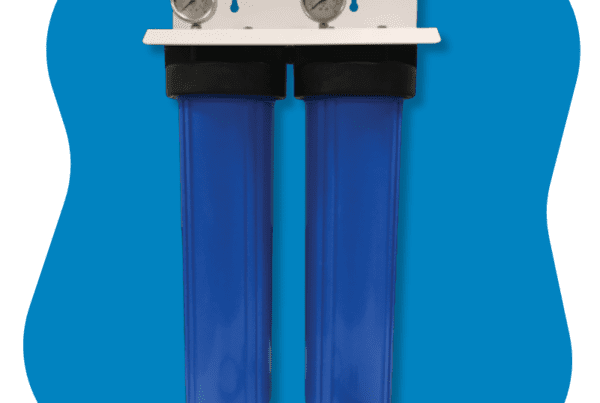Water That Smells Like Rotten Eggs
Smelling rotten eggs in the kitchen? Before you yell at your spouse, child, or roommate for leaving stuff out of the fridge, take a sniff of your water. It might not be anyone’s fault.
If your tap water is emanating a sulfur smell, it’s time to ask a specialist, “why does my water smell like rotten eggs?”
Clean water should be clear and scentless. If it’s not, it’s important to get it checked as soon as possible. A water specialist will need to rule out some causes to find the problem, but they’ll be able to fix it.
If you’re curious about the cause and want to know how to prevent this problem in the future, read on!
 Smelly Water Indicates a Water Problem
Smelly Water Indicates a Water Problem
The rotten egg smell you notice when you use your water is a symptom of a larger problem. This smell can be a byproduct of a few issues, including bacteria, chemical reactions, or an excess of magnesium.
When bacteria multiply in large numbers, they can often give off unpleasant gas. This occurs normally in groundwater or well water. If your water smells like these gasses, it can mean there is an excess of bacteria growing in your water supply.
Bacteria in your water?! Don’t worry. Usually, this occurrence is not dangerous to humans.
If the smell is not caused by bacteria, it could be caused by metal corrosion. Hydrogen sulfide is naturally occurring due to the ions found in water supplies, called sulfate. While these ions are not dangerous to humans, they are very corrosive to metal.
If you have an excess of sulfate in your water supply, it can damage your system. Chemical reactions occur in your water heater when corrosive ions meet the metal parts, causing the smell to enter your water.
Having an excess of magnesium in your water will cause this as well.
Whether your problem is being caused by bacteria, metal corrosion, or magnesium, it could be in different parts of your water supply. A professional will need to perform tests to determine where the problem is originating.
The Effects of Your Smelly Water
When you are smelling rotten eggs in your water, the smell is not the only consequence. A number of things could happen to your home, water supply, and more.
If you have hydrogen sulfide in your water, you could also notice discoloration. Elevated levels of the gas being released into the air, especially in small spaces like your basement, could become a health hazard.
If you are running appliances, the metal of your appliances and the things you put inside them could be ruined. Because sulfates are highly corrosive to metal, you may end up with discolored silverware and a corroded dishwasher.
It could also corrode your washing machine and cause your detergent to not work. Your clothes will not get as clean and may smell.
Every time you use the water, you could be affecting what you use it on. It could make your food taste different or bad. It ends up in the tap water that you consume or use for cleaning.
If the sulfur smell is being caused by bacteria, it could also mean that your water system is getting ruined. The buildup of bacteria could create a white, grey, or reddish-brown slime and clog your pipes.
If you are just noticing that your water smells bad, you will want to call a professional right away.
Source of the Smelly Water
If your water smells bad, you need to answer a few questions to determine the source. The first thing you should be asking to narrow down the search is: when do you smell the sulfur?
A specialist will want to know what types of water you are using when you smell the sulfur. Is it only when you turn on the hot water, use treated water, or in all the water you are using?
Hot Water Smells Bad
Do you only smell rotten eggs when you turn on hot water? This could mean that the smell is coming from your water heater.
Because a tank is an enclosed space with a warm climate, it is easy for sulfur bacteria to settle and grow there. Sulfur bacteria naturally occurs in water supplies, but an excess of it can cause problems in your hot water heater.
Water heaters are metal, which means they are also susceptible to corrosion. If your problem isn’t bacteria, then it’s possible that parts of your water heater are corroding and affecting the water.
A common issue is your anode rods. Anode rods are an essential part of your water heater that helps to accumulate corrosive properties in the water and protect the rest of the tank. This means, however, that the anode rods corrode by nature.
Anode rods corrode over time, leading to chemical reactions inside your tank. This is a reaction between the magnesium rod and aluminum that is in your water heater. Some tanks even have two rods, leading to a stronger rotten egg smell.
Anode rods usually go bad after four years of use. Better maintenance and water quality could lead to them being useful for six years.
Treated Water Problem
Do you only get a sulfur smell when you use treated water? This could mean that the problem is due to the water softener in your system. Hydrogen sulfide easily accumulates in softened water.
When the water smells bad when it’s treated, you need to consider where you live. Do you live in an area that needs to heavily treat the water with a softener? This happens when you live in an area where the water is salty or your system uses hard city water.
The smell would happen whether you use hot or cold water that is treated. You should let an expert know this so that they can recommend a fitting solution. They will probably be knowledgeable of the area’s use of softeners and diagnose your problem that way.
All Water Has Sulfur Smell
If the smell is coming from all of your water, no matter what, then this means the problem is coming from your well system or groundwater. A professional at C and J Water can perform a free water analysis to test for hardness materials.
Ask about our other water testing options to evaluate other issues like iron bacteria, sulfur, sulfate, and hydrogen sulfide. If they find that there is a presence of those in your water, they will be able to diagnose your water source’s issue.
What’s the Solution?
A specialist can diagnose the problem according to cause and location. Then, they can offer a number of solutions to swiftly get rid of the problem.
An AIO Odor and Iron Removal unit is a single tank system that can be installed. This is an economical way to remove iron and odors from your water system. It uses an air bubble in the tank to oxidize any iron before it gets to you.
This takes up very little space and is designed to heighten the pH level of your water. In turn, it effectively removes hydrogen sulfate from your water. No more rotten egg smell!
You can also have a filter installed to remove iron and other unwanted additions from your water. BIF Chemical Free Iron Filters are a low-maintenance and chemical-free way to solve the problem.
This filter uses less water than a single tank system. It utilizes natural oxidization to get rid of iron, hydrogen sulfide, and manganese.
Adding softeners to combat metal corrosion will not help protect in the long term. It’s best to ask an expert to test your water and recommend a treatment based on your hydrogen sulfide levels and system.
Can It Be Prevented?
When it comes to smelling sulfur in your water, prevention depends on many factors. You might not be able to personally do anything to protect your water long-term or effectively.
Ultimately, it depends on your area’s local water quality. If your water is very hard, your appliances are more likely to corrode faster and your water heater will need frequent maintenance.
However, you can be proactive about combatting your area’s problems by speaking to a water specialist. Get your water tested to understand the source of the smell and talk to them about units you can install.
Certified water specialists are the best people to talk to for solutions to your water problems.
Get Help Now
Why does my water smell like rotten eggs? You’ll only know the answer if you call a professional to check your water. They can perform the right tests, ask the right questions, and recommend the right solutions so you can stop being disgusted by your water.
Start getting your life back with a free water analysis today




